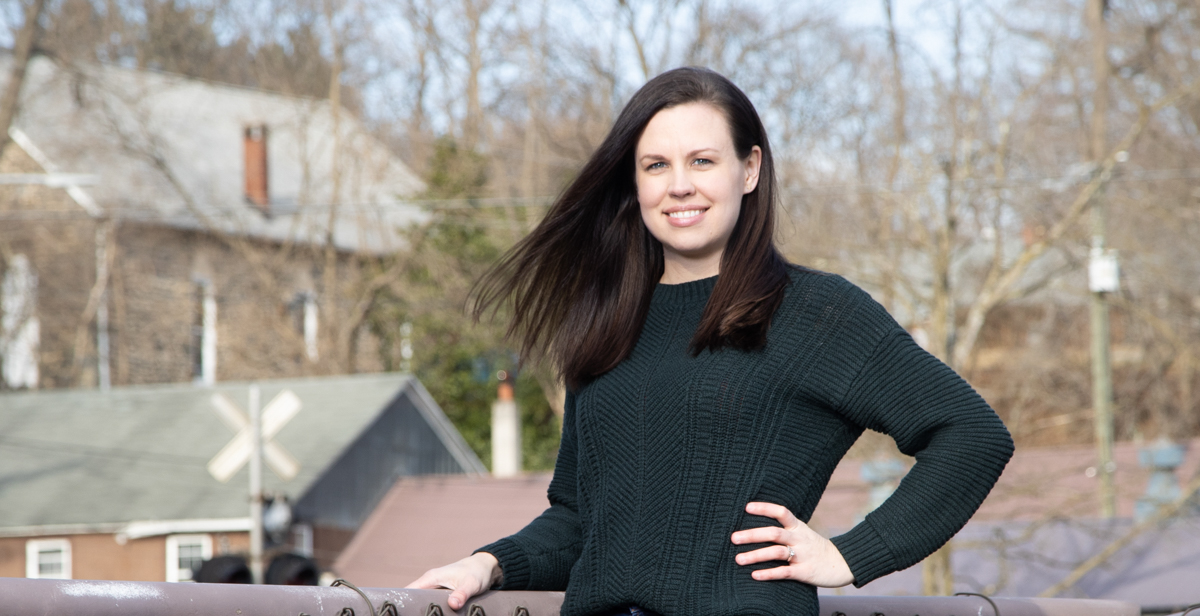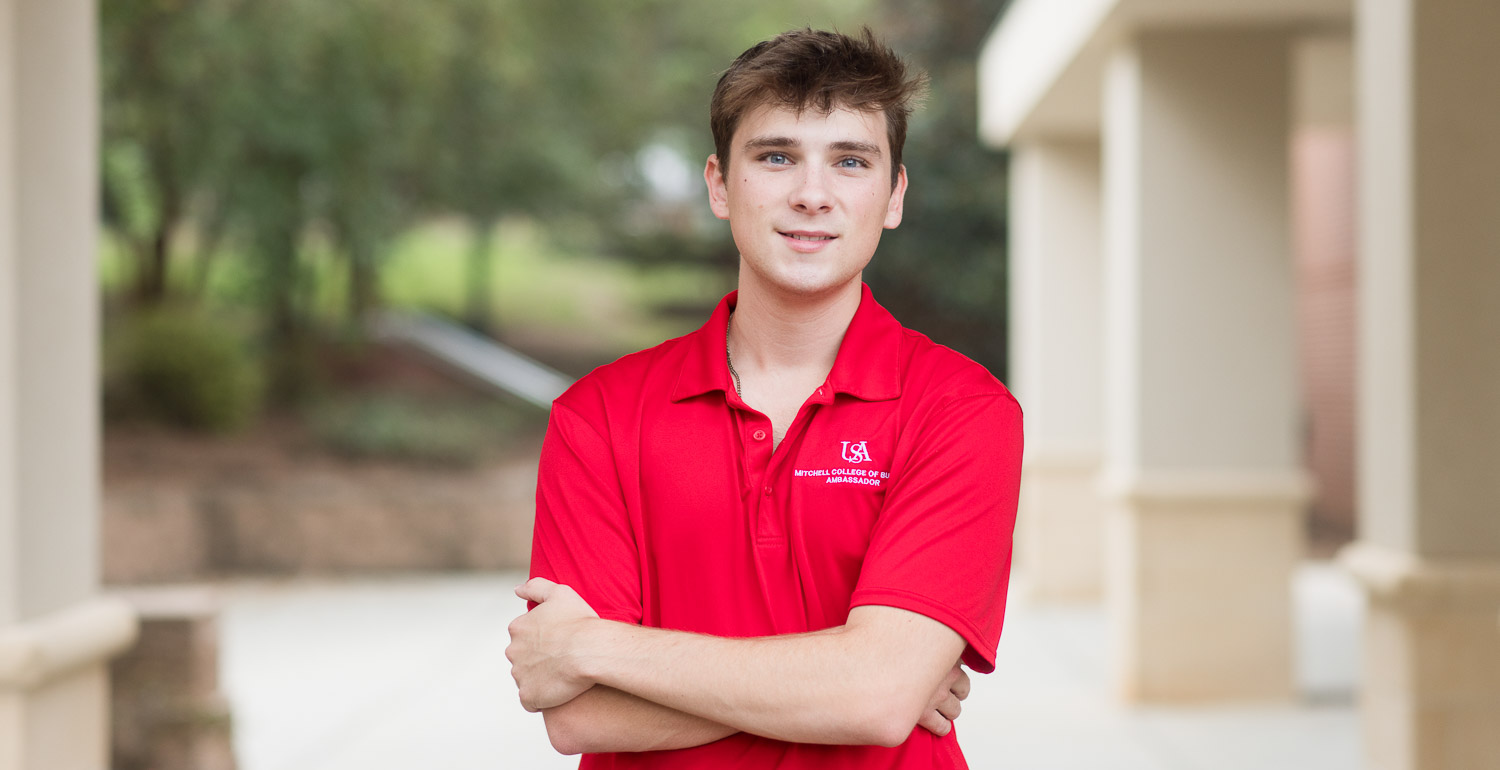Peace Offering: Alumna Assists Refugee Families
Posted on February 22, 2022

The University of South Alabama is running a series beginning Martin Luther King Jr. Day that focuses on South students, employees and alumni who are advancing Dr. King’s vision in six areas – poverty, jobs and wages, housing, education, justice and peace. Today’s story is on peace.
Long before joining the Peace Corps, Rachel Burdine chose her own path, even as a middle school student growing up Minnesota.
Many of the kids in her grade chose Spanish as a foreign language, so she picked French. “I didn’t want to do what everyone else did,” she said.
In high school, she looked forward to visiting France on a class trip. After her family moved, Burdine contacted her old school and still went on the French trip with her classmates.
She started college in Minnesota before transferring to the University of South Alabama. She majored in international studies, graduated in 2009, and volunteered with AmeriCorps and Worldwide Opportunities on Organic Farms until ultimately serving in the Peace Corps, which had become another great passion.
“It just clicked,” she said. “That’s what I wanted to do. I always wanted to serve vulnerable populations. I always wanted to be in that sphere of humanitarian work. I think I always considered the bigger picture of things. I wanted to live a lifestyle completely different from what I’d ever known.”
In 2012, Burdine was posted in Cameroon, a French-speaking nation in West Africa.
She was thrilled. Her parents? Not so much.
“They didn’t want me to go,” she said, “but they knew they couldn’t stop me.”
The highlight of her two years in the Peace Corps was planting 2,000 acacia trees at a middle school in the city of Garoua. The idea was to provide cooling shade for students in what had been a sun-baked neighborhood. Just recently, she spoke with one of her former partners in Cameroon.
“I asked how the trees were,” Burdine said, “and he said it was a lush forest.”
After the Peace Corps, she returned to Minnesota and worked for Arrive Ministries and then World Relief. Her job was to help refugee families from war zones and disaster areas get settled in the United States. Often, she was the first person they met at the airport.
Burdine would often apologize for what were spartan accommodations, but that didn’t matter to many immigrant parents.
“They’d just break down, very grateful to feel safe,” she said, “and have a future for their children.”
Now Burdine and her husband, who was also an aid worker, live with their daughter in a suburb of Baltimore. She still works for World Relief, but her position is that of a program officer supporting the organization’s network of offices resettling refugees. She hopes this experience will help her move into management.
“I’d like to take on more of a leadership role,” she said. “I like the idea of mentoring people and serving our offices in a larger capacity.”
Having the right attitude
Dr. Susan McCready, chair of the department of modern and classical languages and literature, was director of international studies at South when Burdine was a student.
“I can’t say enough nice things about Rachel,” she said. “She was someone who always had a plan and always knew what she wanted to do.”
When Burdine came back to the United States, she returned to South and spoke to students in international studies. She offered a candid account of her time in Cameroon. She brought along photos of things like extraordinarily large spiders.
“She wanted to show the reality of working with the Peace Corps,” McCready said. “You’re roughing it in a lot of places. You have to have the right attitude for that kind of situation. And she’s that kind of person, who’s open in that way.”
Rebecca Young, one of her Peace Corps colleagues in Cameroon, is a nurse in Pittsburgh. She remembers them gathering with local people at a tea stand in the center of the village where they lived and worked. On quiet evenings, without much to do, aid workers would meet to play cards or board games such as Settlers of Catan.
Burdine made an impression.
“She’s a real motivated person who stands up for what she believes in,” Young said. “She’s very organized and focused.”
Minnesota to Mobile
Burdine grew up in Minnesota, where her father worked for different paper companies. They shared a love for movies that remains a big part of her life.
Her three favorite films are “Inglourious Basterds,” “Moulin Rouge” and Jurassic Park.”
After two years of college in Duluth, Burdine followed her father to the Gulf Coast and enrolled at South. She lived in Foley and commuted to class. She worked long hours as a waitress at different restaurants.
She didn’t have much time for extracurricular activities.
“I was driving to and from school every day,” she said, “but I think that made me want to get even more out of my classes.”
After graduating from South, Burdine joined the Peace Corps and journeyed to Cameroon as an agro-forestry worker.
At her first posting, she tried to help local farmers in a small village outside the city of Ngaoundéré. She got to practice her French and teach English to young students. Then she got sick.
For weeks, off and on, Burdine was ill, throwing up and dehydrated. Finally, she had to leave the village for medical care. She never did learn what her sickness was, but she felt better after transferring to another region of Cameroon.
That’s where she did her tree-planting project.
Her Peace Corps service ended just shy of her 27-month commitment when aid workers had to be evacuated from northern Cameroon because of danger from the Boko Haram terrorist organization, notorious for kidnapping students in nearby Nigeria.
When Burdine returned to Minnesota, she suffered from culture shock. There were so many choices for food, shopping and entertainment.
“Let’s just go home,” she would tell her mom. “I can’t handle this.”
She enjoyed her work resettling refugees with Arrive Ministries. At World Relief, she met her husband, Fred, who had been an aid worker in Lebanon. They have a 3-year-old daughter named Hazel.
Burdine and her family moved to Baltimore, where her sister-in-law lives, when she joined World Relief. After living near downtown in a neighborhood called Pigtown, they moved to the suburbs of Sykesville, Maryland.
Her career in aid management is part of a lifetime commitment. She and her husband have talked about returning to Peace Corps work one day after they retire.
“Only at the end of my service did I feel like I was doing good work,” Burdine said. “I’d like to do more in another go round.”



